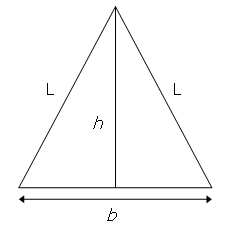This website is a semi-functional mirror of the original Project Euler. More information is available on GitHub.

Special isosceles triangles
Problem 138
Published on 20 January 2007 at 11:00 am [Server Time]
Consider the isosceles triangle with base length, b = 16, and legs, L = 17.

By using the Pythagorean theorem it can be seen that the height of the triangle, h = √(172 − 82) = 15, which is one less than the base length.
With b = 272 and L = 305, we get h = 273, which is one more than the base length, and this is the second smallest isosceles triangle with the property that h = b ± 1.
Find ∑ L for the twelve smallest isosceles triangles for which h = b ± 1 and b, L are positive integers.
Go to back to Problems